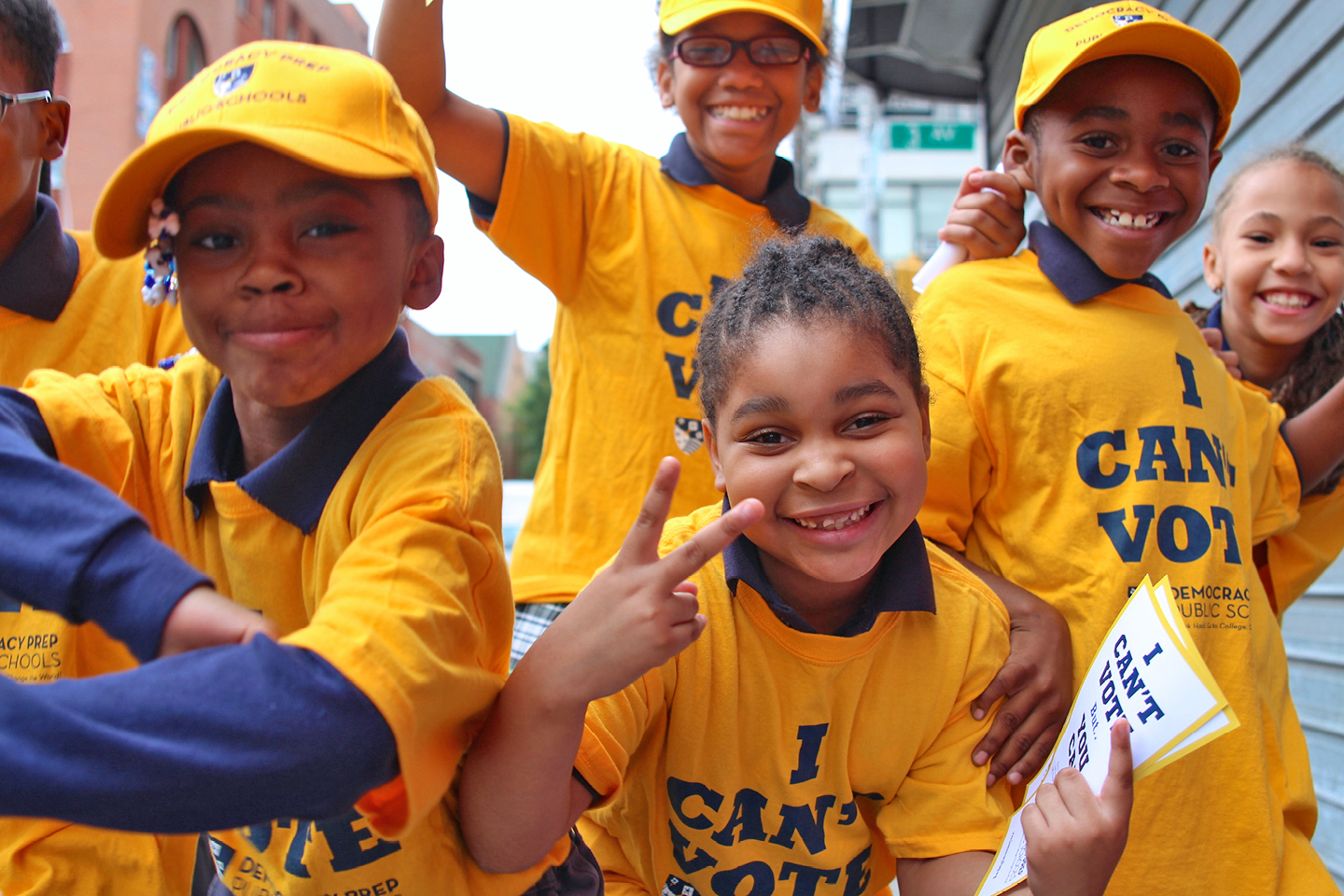With the primary season now underway, a study has just been released finding that a network of charter schools appears to have improved students’ civic participation as adults through a focus on attitudes and activities, not just knowledge. The findings could prove valuable for schools in other sectors, from traditional public schools to religious and independent schools.
The study comes at a time of frequent pessimism over students’ proficiency in civics. Sarah Shapiro and Catherine Brown of the Center for American Progress have written:
While the 2016 election brought a renewed interest in engagement among youth, only 23 percent of eighth-graders performed at or above the proficient level on the National Assessment of Educational Progress (NAEP) civics exam, and achievement levels have virtually stagnated since 1998. In addition, the increased focus on math and reading in K–12 education—while critical to preparing all students for success—has pushed out civics and other important subjects.
Shapiro and Brown also note that “state civics curricula are heavy on knowledge but light on building skills and agency for civic engagement.” This omission may be contributing to low voter turnout and lean participation in local politics.
Policymakers have tried to remedy the situation through various means, including making the test for naturalization as a US citizen a high school graduation requirement. NPR.org reported,
Recently, 14 states considered bills to incorporate content from the naturalization test. Four states—Nevada, Oklahoma, Pennsylvania and Washington—adopted those bills into law. Twenty states already had requirements related to that test: Some require passing an exam based on it to graduate from high school; others loop it into a half-credit civics requirement.
However, there is a difference between passing a class or a test and becoming civically engaged as an adult. In Making Civics Count: Citizenship Education for a New Generation, David Campbell argues for the vital importance of a school’s “ethos” in predicting long-term civic engagement. He writes,
By ethos, I mean the norms encouraged, shared, and “enforced” within a school community—such as interpersonal trust and an expectation of public engagement. While perhaps not as easy to observe as classroom instruction, extant research indicates that a school’s ethos has a substantial, and enduring, effect on the civic engagement of its students.
The idea of a pervasive and reinforced ethos is further explored in The Content of Their Character: Inquiries into the Varieties of Moral Formation, which discusses the importance of a “thick” moral ecology in the shaping of character and citizenship.
The kind of ethos described by Campbell, characterized specifically by an “expectation of public engagement,” has been the stated focus of a network of open-enrollment, high-performing charter schools called Democracy Prep. Serving more than 6,500 students in five cities, mostly from low-income families of color, its mission is “to educate responsible citizen-scholars for success in the college of their choice and life of active citizenship.”
If a life of active citizenship can be at least partially measured by adult voting registration and voting rates, Democracy Prep is succeeding. Mathematica Policy Research, founded in 1968, recently conducted a study comparing Democracy Prep graduates with individuals who were not selected by the random entrance lottery. Mathematica reported that
- We find a 98 percent probability that enrolling in Democracy Prep produced a positive impact on voter registration, and a 98 percent probability that enrolling produced a positive impact on voting in the 2016 election.
- Democracy Prep increases the voter registration rates of its students by about 16 percentage points and increases the voting rates of its students by about 12 percentage points.
This proof of adult engagement after graduation is arresting, and it naturally prompts the question, How did they do it? According to founder Seth Andrew, learning facts about civics is not enough. Democracy Prep’s approach is threefold, emphasizing civic knowledge, civic skills, and civic dispositions in a deliberate sequence. He told Education Next:
We need more civics taught in middle and high schools, but that doesn’t mean having a boring one-semester course requirement. It means creating outcome expectations around civic skills and knowledge. Lots of states now mandate x amount of civics in high school. I think that’s the wrong way to think about it, because it focuses on input as opposed to outcomes. In the Democracy Prep civic-outcomes model, we actually don’t teach “civics.” There is no standalone “civics” course. However, there is a course on the “sociology of change,” a course on economics, and a senior seminar on American democracy. We require a “change the world” project for seniors, and we hold Election Day get-out-the-vote campaigns at least once every year … What we’re trying to do is remind the world that “civic education” is not about a specific course; it’s about the public purpose of education and putting citizenship first.
Democracy Prep’s emphasis on citizenship is unusual. But the researchers who studied its success pointed out,
its success in raising the registration and voting rates of the low-income minority students it serves provides a proof point for charter schools and conventional public schools alike: an education focused on preparation for citizenship can in fact increase students’ civic participation when they reach adulthood. Renewed attention to the foundational purpose of public schools might broadly increase civic participation across the country.
A long-term study of a school’s impact on students’ behavior post-graduation—complete with a valid control group—is a rarity, and the findings of this one are particularly encouraging. Beyond an affirmation of the efforts of Democracy Prep, they may point the way for other schools seeking to instill civic engagement. And in a country where young people are often characterized as politically apathetic, this is good news indeed.

